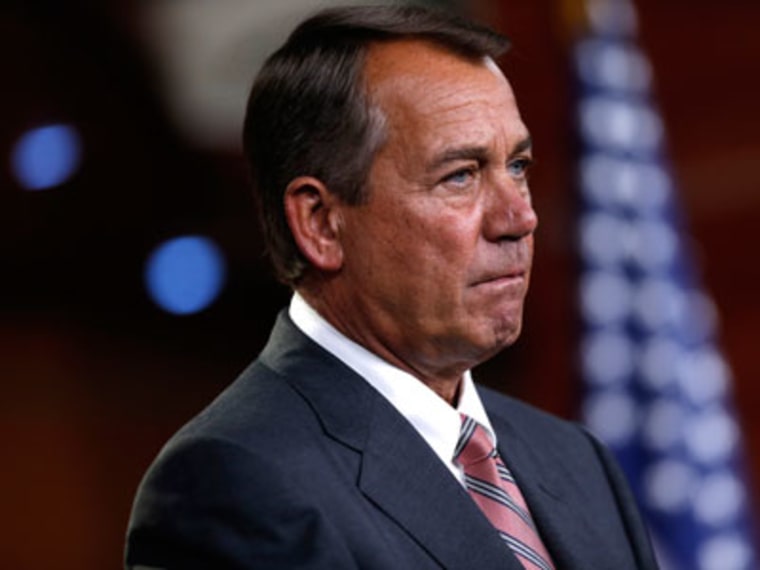The American public's dissatisfaction with Washington has reached new heights, according to the latest NBC News/Wall Street Journal poll, as the political world continues to fight the same intractable battles over the budget, health care and immigration.
A whopping 83 percent of Americans disapprove of Congress' job, which is an all-time high in the survey. What's more, President Barack Obama has seen his job-approval rating dip to its lowest level since August 2011, when the debt-ceiling showdown wounded almost every Washington politician.
And nearly six-in-10 voters say they would vote to defeat and replace every single member of Congress if they had such an option on their ballot another all-time high.
"There is a palpable unhappiness with Washington," says Democratic pollster Peter D. Hart, who conducted this survey with Republican pollster Bill McInturff. "Outside the Beltway, voters are saying, 'You don't get it.'"
Democratic pollster Fred Yang, who partners with Hart, paraphrases from Shakespeare to describe the public's mood: "Now is the summer of our discontent."
Why is the public unhappy with Washington?
Asked to explain their dissatisfaction, respondents cite (in order) partisanship and the inability of Congress to get things done, middle-class Americans being ignored and the Obama administration's policies and leadership.
But there's a stark political divide: Democrats and independents blame partisanship and congressional gridlock as their chief culprit, while Republicans blame the president.
Still, there are signs that Republicans are shouldering more of the blame for the situation in the nation's capital: just 22 percent say they believe the GOP is interested in unifying the country in a bipartisan way, versus 45 percent who say the same about Obama.
And while 56 percent of Americans say they think congressional Republicans are too rigid in their dealings with the president, a plurality of GOP respondents say congressional Republicans are too quick to give in to Obama.
"In their mind, Republicans have been too quick to give in to Obama," says McInturff, the GOP pollster, about the views of self-identified Republicans in the poll. "For the average Republican House member, he or she is more likely to be concerned about a primary than general election."
When it comes to immigration reform, 44 percent of adults (including 49 percent of Latinos) say they would blame Republicans if Congress doesn't pass legislation by the end of its current term.
By comparison, 21 percent of respondents (including 21 percent of Latinos) would blame the president, and 14 percent would blame congressional Democrats.
Additionally, 59 percent of all adults (and 79 percent of Latinos) say they believe the notion that border security must precede immigration reform a view espoused by many congressional Republicans is an excuse to block reform, while only 36 percent say it's a legitimate excuse.
Obama's approval rating drops to 45 percent
The poll also shows that the president's overall job-approval rating stands at 45 percent, a 3-point drop from last month, although it's within the poll's margin of error.
That rating is one point off from his all-time presidential low that came in Aug. 2011.
"He's in a little bit weaker shape," says McInturff.
The drop is explained in part by an erosion in support among African-American respondents -- 78 percent approve of his job, down from 88 percent in June and 93 percent in April.
(The NBC/WSJ pollsters speculate that George Zimmerman's acquittal in the shooting death of Trayvon Martin could explain this drop, especially given African-Americans' increased pessimism about the nation¹s direction, according to the survey. The poll was conducted in the days following the verdict and includes responses that were received before and after the president's recent comments addressing Martin's death.)
Also in the poll, a combined 44 percent say they are either "optimistic and confident" or "satisfied and hopeful" that Obama will do a good job during the rest of his second term in office down 7 points from January 2013, at the beginning of the president's second term.
By contrast, a combined 56 percent say they are either "uncertain" or "pessimistic" about the remainder of his second term up 8 points since January 2013.
And just 34 percent believe the president's health-care law is a good idea, versus 47 percent who say it's a bad idea, which is virtually unchanged from June.
But by 51 percent to 45 percent, respondents say congressional Republicans should stop trying to block the law instead of doing everything they can to prevent it from being implemented.
Congress' approval drops to 12 percent
Meanwhile, only 12 percent of respondents approve of Congress' job, which is tied for its lowest standing in the history of the poll. And 83 percent disapprove, which is the highest-ever rating for the legislative branch.
What's more, 57 percent of registered voters say they would rather elect a new person to Congress than their current representative, and an equal number would replace every member of Congress if they could vote to do so the highest percentage on this question dating back to 2010.
Despite these findings, voters don¹t have a clear-cut political preference for next year's midterms: 44 percent want a Democratic-controlled Congress, and another 44 percent want a GOP-controlled one.
A split on the Supreme Court but with a twist
After its recent rulings striking down the Defense of Marriage Act and gutting much of the 1965 Voting Rights Act, the American public is divided on U.S. Supreme Court: 40 percent see it as too liberal, while 38 percent view it as too conservative.
But there's a twist: Two-thirds of self-described liberals believe the court is too conservative, and nearly seven-in-10 self-described conservatives see it as too liberal.
The NBC/WSJ poll was conducted July 17-21 of 1,000 adults (including 300 cell phone-only respondents), and it has an overall margin of error of plus-minus 3.1 percentage points.
this story was first published on NBCNews.com here.
